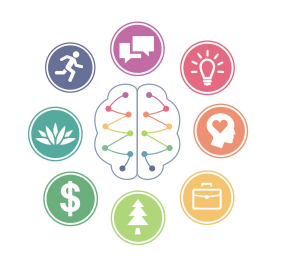Navi is an anonymous virtual agent that provides you with information to help you navigate mental health resources and make decisions about seeking appropriate supports.
Below are some resources from around UofT to help cultivate wellbeing within CSB. If you come across resources that you think should be on this list, please contact us and spread the knowledge.
Resources for Faculty and Staff
- Calendar of various wellness webinars put together by UofT Human Resources. Topics range between child and elder care, parenting techniques, self-defense (virtual) amd more. See the calendar here.
- Community Safety Office at UofT (Tri-campus) support service to help members of the UofT community who have any safety concerns like: stalking and harassment, bullying and intimidation, threats, family and intimate partner violence, and workplace conflict and volatile behaviour. Many valuable resources and tips are available on their website, but you can also use their services through the UofT Campus Safety App.
- Wellness hub through HR and equity provides support for mental, physical, emotional and financial wellbeing of employees of UofT. They can be accessed here.
- Employee and Family Assistance Program available to UofT employees who are part of the group benefits plan and their dependents. The program provides counselling, coaching, online resources and referral to professional help. More information about the program is here.
- Family Care Office at UofT provides resources and support/training on topics of child/elder care. More information here.
Resources for Students
- The collated mental health resource for students across UofT, which provides resources, ways to improve well-being and links to get help/urgent assistance is here.
- Grad Minds is the mental health committee at UTGSU and they provide a whole series of resources on the topic of well being, as well as bi-weekly seminars/workshops. Some of the webinars offered in the past include “Surviving grad school: A toolkit fluorishing mental health” and “#SafeSocial: Social Media’s impact on mental health” and more. You can find more information here.
- Navi is the mental health wayfinder for students at UofT. Through a chat-based system, it helps direct the user to the best mental health resources they need. Navi can be accessed here.
- Gerstein Centre Mental Health Crisis Helpline provides mental health crisis support, strategies for addressing immediate problems and connecting user to ongoing support. They are available 24/7 and can be reached here or through their phone number: 416-929-5200.
- Good2Talk Helpline will provide professional counselling and referrals for mental health, addictions and student well-being. They can be reached here or through their phone number: 1-866-925-5454. You can also text “GOOD2TALKON” to 686868 to get in touch with them over text.
- Whats up Walk-in provides virtual counselling sessions for children, young adults and their families. You are able to talk about any problems you have, nothing is too big or too small. They can be reached here.
- Community Safety Office at UofT (Tri-campus) support service to help members of the UofT community who have any safety concerns like: stalking and harassment, bullying and intimidation, threats, family and intimate partner violence, and workplace conflict and volatile behaviour. Many valuable resources and tips are available on their website, but you can also use their services through the UofT Campus Safety App.
- LinkMentalHealth uses a short survey to match you with a therapist with the expertise you need, and you can then have a virtual appointment with them online. User may need to use their health insurance coverage for the services. They can be accessed here.
